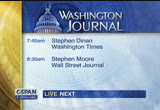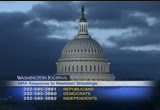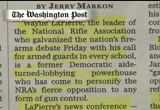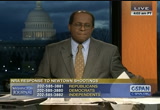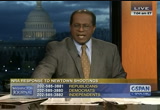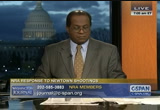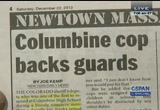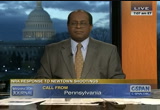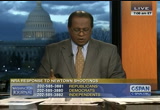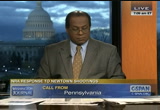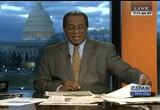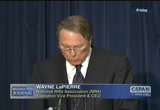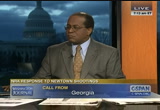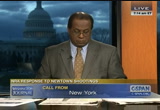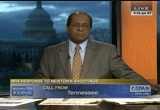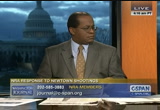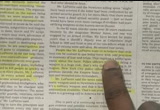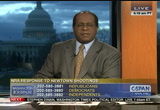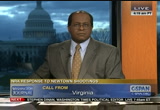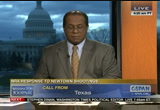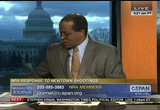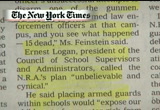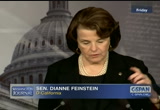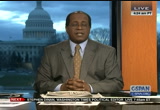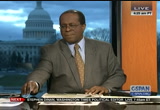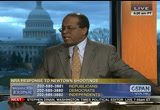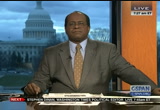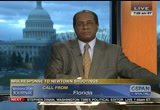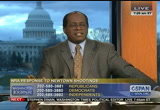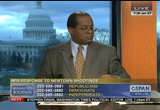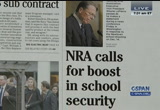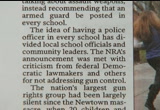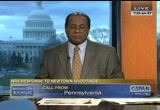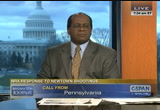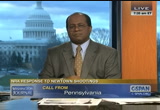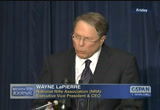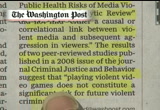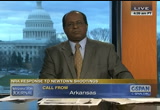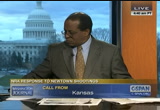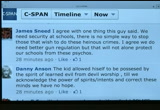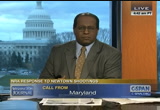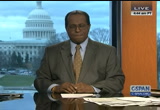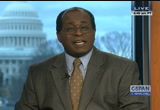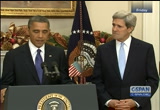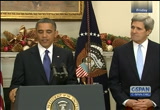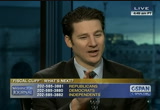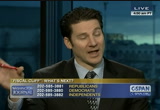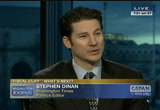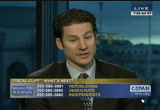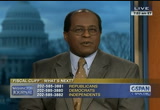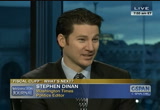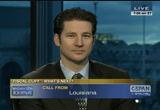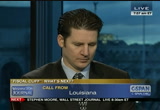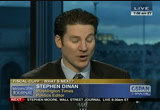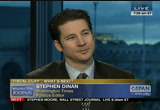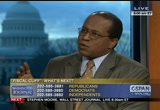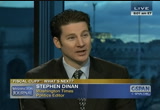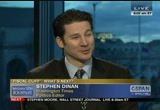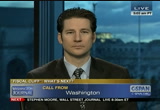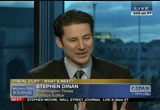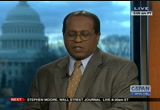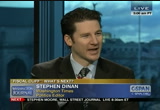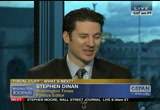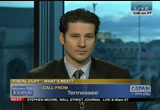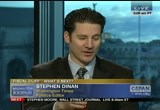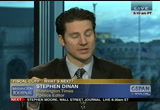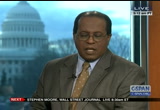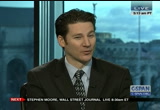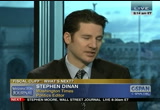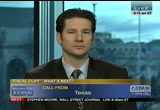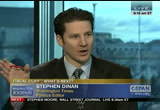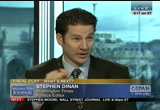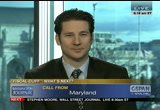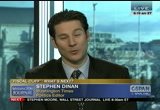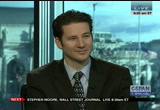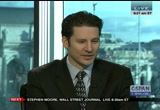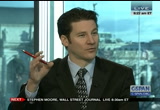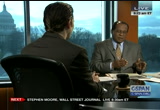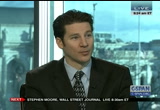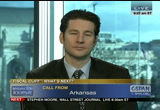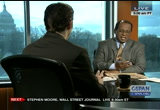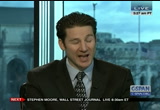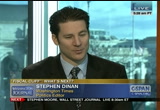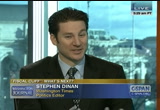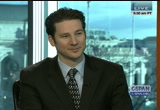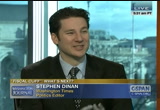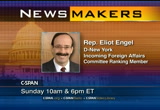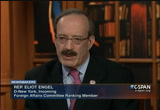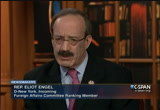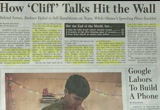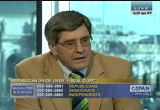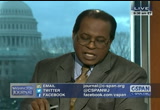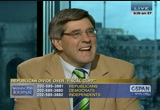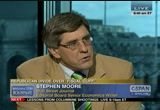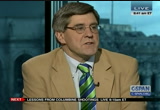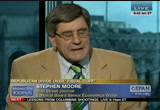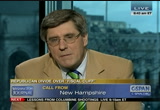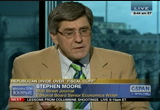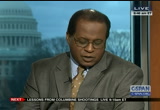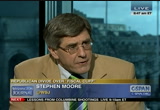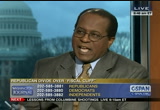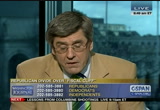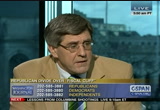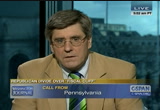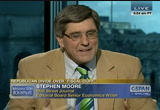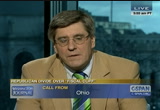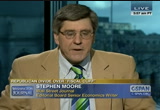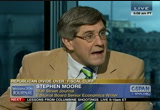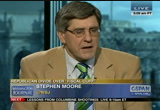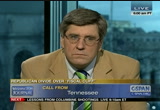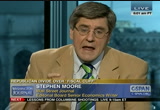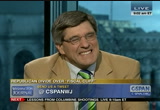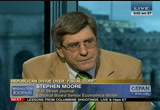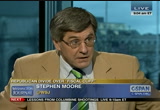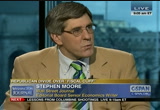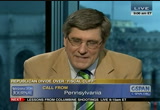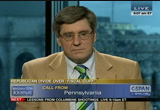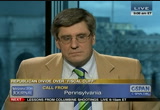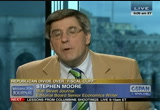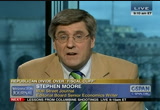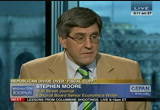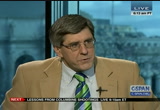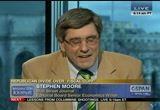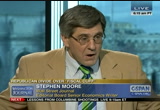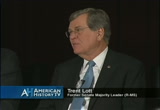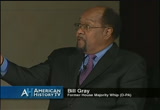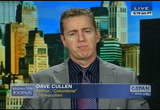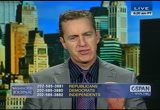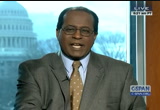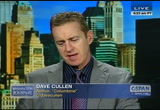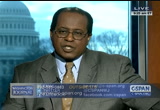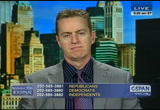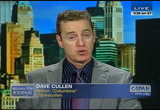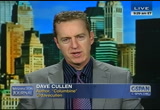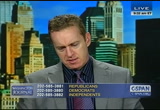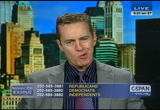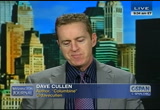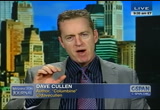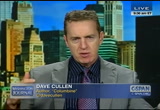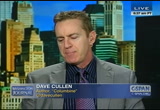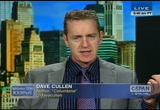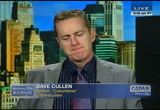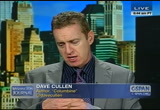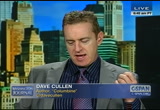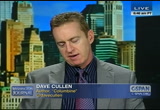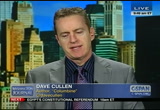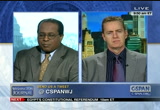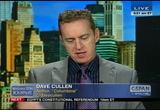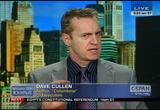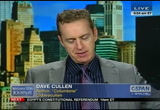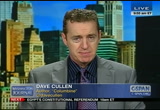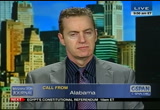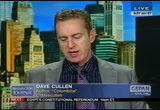tv Washington Journal CSPAN December 22, 2012 7:00am-10:00am EST
7:00 am
between house speaker boehner and president obama. with stephen moore of the "wall street journal" and later the author of "columbine" and what we have learned from that tragedy and how it applies to the shooting in connecticut. >> i called on congress today to act immediately on what is appropriate to put armed police officers in every single school in this nation. [captions copyright national cable satellite corp. 2012] [captioning performed by national captioning institute] >> the headline in this morning's baltimore sun reflects those across the country. from the tribune's washington magazine, it's said when he weight in friday he delivered a
7:01 am
lashing speech that included violent movies and video games as he said his plan would train those to guard our schools. in this edition of today's program, we're going to begin the first 45 minutes of the program to talk about the nra's response to the shootings. they broke their silence yesterday with executive director and vice president wayne. we'll talk more about what he had to say. but we want to get you involved in the conversation. so the numbers on your screen. guest: we also have a special line this morning for members of the n.r.a.
7:02 am
7:03 am
guest: we'll get back to more of the newspaper articles this morning regarding the n.r.a.'s response to the newtown shootings. first up leslie from wash burn, maine. leslie, go ahead. caller: yes. i'm originally from northern maine and moved here from northern new york and i personally had a second-grade and third-grade teacher killed from mentally unstable students.
7:04 am
one used a knife and one beat a teacher. i personally believe this is a mental health problem and everybody knew they had problems. until they take care of the mental health problem, you're going to continue to have deaths. host: so you say you're in support of having armed guards in schools around the country? >> yes, i am. caller: i'm a 23-year army veteran and i've hunted and fished all my life. host: there were reports that there was an affirmed guard at columbine and that didn't seem to deter those boys from doing -- causing the mayhem that they had. caller: that was a large campus at columbine, and you've got to have gareds at the gate and if you have a huge place, you need more than one guard.
7:05 am
i've been in combat in the army. host: where were you? thank you for your service. caller: i'd like to make a couple of points, the n.r.a. and republicans are wrong. to have armed guards in our school, the republicans have been telling us that our country is going down and we have no money but all of a sudden we're going to have money to fund guards at our schools? and another thing, the n.r.a. makes movies that are being sold to our children that fund all these video games that show the guns being shot and people being shot up by the guns. and another thing, when republicans support the n.r.a., do you really feel the n.r.a. really cares if you or your child gets shot or murdered by
7:06 am
somebody with one of these assault rifles? they don't care if they get killed. you're just helping them make their money, their dollars, and you're doing their bidding when you support what they are doing. and it was george bush that let the n.r.a. sell assault rifles to our people. it's wrong. and you can't have everybody being armed with guards at all of our doors. even in our public streets? you're going to have armed guards? is that what you really want? think about it. host: in this morning's "daily news," a little story about the columbine guard we referred to earlier. joe kemp writes --
7:07 am
host: back to the phones. we've got kenneth in you are the botville, pennsylvania. he is a member of the n.r.a. kenneth, how long have you been with the n.r.a.? caller: probably for 25-30 years. host: and what did you think about what mr. lapierre had to say yesterday? caller: i thought it was well overdue, and i thought it was dead on as far as the need -- what we need to do in our country. host: so you're in favor of having armed guards in schools? caller: i am.
7:08 am
i think it's a sad testament of where our society has gone with regards to the video games and the violence in the movies. i sadly listened to the woman that preceded me, and she is spouting the rhetoric that the liberals tried to ezzpows like the assault rivals. the government dyeds what -- decides what type of firearm every person in the united states of america is allowed to own or not allowed to own, that is the start of the loss of the second amendment, and that will be the disarming of the united states of america. host: kenneth, you talked about the liberals. but in this article, the "new york daily news" this morning, they quote several republicans, among them, senator tom coburn,
7:09 am
also objected to lapierre's plan, sort of. he said -- host: what are your thoughts to those responses from those republicans? caller: i agree with those comments. let me say this, as far as the more broad sense of this issue with regards to the connecticut shootings. it's perfectly clear that the young man that committed that atrocity was troubled individual. the problem with our society is that we need something to
7:10 am
recognize, deal with, and stride help with, for the people, the families, the parents that have to do that. i've read a number of articles since then where by sthradse have that mental illness, but when they go to seek the help from the law enforcement officers, etc., they are advised that they should today? contact with their police, because there's not intervention unless the individual breaks the law, and then they are thrown in with the common lawbreakers in the jail. that's not the way we should treat the sick individuals. we have a society. if obama wants to do something, and anybody, i don't care if you're democrats or republicans, start dealing with the mental health issues that are enabling these people to be
7:11 am
put out on the street and have to be concerned and burdened with their family members. like guns are doing away with guns and doing away with the private ownership of guns, and i don't care what kind it is. yes. there's a difference of opinion as far as -- i have many of the individuals that i know that are law enforcement police officers that have them for their personal thing. i respect that. i don't know move them. but that doesn't mean that somebody else doesn't. host: kenneth, we're going to live it there. member of the n.r.a. in pennsylvania. we want to show you more from yesterday's news conference that featured n.r.a. executive vice president wayne lapierre. he explains further that what the n.r.a. is willing to do to develop a model of national
7:12 am
schools shield response program. this is a little bit more about what he had to say at yesterday's news conference. [video] >> the n.r.a. is going to bring all its resources to develop a model national school shield emergency response program. for every single school in america that wants it. from armed security to building design and access control, to information, technology to student and teacher training. this multi-faceted program will be developed by the very best spirits in the field. -- experts in the field. former congressman hutchison will lead this program. with a budget provided by the n.r.a. on whatever scope the task requires. host: that was wayne lapierre,
7:13 am
n.r.a. executive vice president in a news conference here in washington yesterday. more on the discussion and response by the n.r.a. this is steve from covington, georgia on our line for independents. steve, you're on the "washington journal." caller: good morning. i'd like to say to your last caller. i've got two little girls. they are twins, 7 years old. they came running in here crying and i got up to see what they were watching, and they were calling for blood in the streets. the union was calling for blood in the streets up there, and it scared them to death. they said daddy, are they going to kill us? i said, no, i don't think. so if we're going to have to limit our clitches to 10 bullets, the union is going to have to limit their members to
7:14 am
10 people, because they get on jeeps and yelling stuff, and it's scaring people to death. host: jerry? caller: i'm not a gun owner but i'm also not anti-gun. i do shoot rec creational like when i visit my friends and stuff, but i think it's ridiculous that we cannot come to a consensus in this country that these things are dangerous. like, it's not about democrat or republican. if anybody shouldn't agree that we shouldn't have semi automatic rifles that spew bullets at a rapid pace, this is not good. as far as armed guards in schools, this is ridiculous. instead of having people shooting up mass amounts of people, you're going to have a fire fight inside the school? this is ridiculous. i come from a neighborhood in brooklyn where people have gunfights and it's not a nice
7:15 am
place, so why would you even suggest -- no. i'm not anti-guns. i believe in the right to bear oorms but the fact that this country is so split apart that we can't agree that they can't have these high-powered weapons is ridiculous. host: robert is a member of the n.r. a. your response to the comments made yesterday by executive vice president wayne lapierre. caller: well, we have actual police officers and deputy sheriffs in our schools and county. have had them for a long time. they are called a resource officer, and it works very well. we have very few incidents of anything in those schools. they have even called in for checks on drugs and everything. they do more than just patrol. i'm a full-time mental health
7:16 am
counselor as well, and i have no problem doing that in schools, but we have got to come out and talk about mental health. it's not about just that. mental illness is the same as any other disease. let's have an open discussion about that. host: among other things executive vice president lapierre mentioned, he talked about violence in television and video games, as a mental health professional, do you see a correlation between video games and the actions and behavior that has been prevalent over the last couple of years? >> absolutely. those things. remember how we have r.-ratings on music and movies? little children should not be playing these video games or
7:17 am
watching the movie like that and i remember when dirty harry came out of the, i wanted to get a big gun. that was an influence on my own psyche about watching a fabts and fable show. and we are influenced by what we see, hear, and do. and just like some of the music puts women in a low position and degrades women, that kind of garbage needs to stop, because some people live what they hear and see. host: robert, the n.r.a. crawls from its hiding hole and they finish out the editorial by saying people like lapierre want us to believe that civilians can be trained to use lethal force in moments of fear and crisis that, requires a willful ignorance about the facts. police officers know firing a
7:18 am
weapon is a huge risk, that's why they avoid doing it. in new york city police officers opened fire an man and killed him and wounded nine people, a police officer called the weapon used in newtown a machine gun and fires the most powerful ammunition available. that's not true. what's true is that there's a growing call in america for stricter gun control. caller: i was a police officerful time while i went to college. we trained and did the best we could. but you never know how you're going to act until that moment happens and your body is stressed at the moment. host: have you ever had to pull a gun on somebody? caller: yes. as a police officer. i did, because the situation changed in a moment, a second. i pulled, they dropped their gun. host: weaver going to move on
7:19 am
to mark in virginia beach for our republican line. caller: i don't know what more can be done. i think the n.r.a. has a constructive decision or suggestion. the gentleman from tennessee, school resource officers really prevent -- they -- prevention and other benefits from a school resource officer. being in schools like a child may have an improper home situation. so i think the n.r.a. made constructive suggestions on what needed to be done. i really don't have a problem, because in the south beach we have something in our public schools called school resource officers. host: james from san antonio, a member of the n.r.a. how long have you been a
7:20 am
member? >> about eight years. host: what kind of guns do you own? caller: a variety. a semi automatic handgun, shotguns and rifles. host: anything reaccidentalibling the bush master rival used last week? caller: no. but i have trained, because i was a corrections officer in the state of texas and we used the a.r.-15, that's 2 primary weapon for towers. host: what did you think about what mr. lapierre had to say yesterday in his news conference caller: well, see, the thing is, actually, he should have came out and with the facts. the facts show that every country that has a ban. every country that has banned weapons, the crime rate has soared because bad guys know
7:21 am
now that the good guys can't protect themselves anymore. so i mean, what do we do? we need to make sure that the guns don't get into the hands of people that have psychological issues that -- that's a big problem, and i'm really sorry about what happened there in newtown. it was a tragedy, you know? but i believe it was the mother's fault, because she should have made sure, knowing that her son had these psychological issues, so this was the actions of one individual, but her being a teacher. come on. she had to know, so it's totally ridiculous. but the way things are going down, it's like it was a group of people that was terrorists that came through with this, you know? and it shows that when people
7:22 am
arm themselves, they are less likely to come in somebody's home, because of the fear of being shot. host: that's another member of the n.r.a. in an article in this morning's "new york times," they quote senator dianne feinstein who was at a news conference on friday, she is the california democrat who is leading an effort to reinstitute a ban on salmt rifles. she wrote -- host: i want to show you more of what she had to say at the news conference yesterday saying that the n.r.a.'s blanket call to narms our schools is nothing more than a
7:23 am
distraction. this is more of what she had to say. [video clip] >> if the schools want to hire armed guards, i support that. it's a decision each school district should make and many school districts already have armed guards. in fact 28,300 public schools. that's act 1/3 of all public schools, have armed security staff. in fact, there were two armed law enforcement officers who twice engaged the shooters at columbine. that didn't prevent 15 from being killed and 23 wounded. copies of the sheriff's investigative transcript with exactly what happened are available right at the back of the room. the n.r.a.'s blanket dual arm our schools is really nothing more than a distraction. it's a delay tactic.
7:24 am
it's a distraction from the veilibility of military-style assault weapons on our streets, in our schools, used at malls, and workplaces and movie theaters. and they allow for much death and destruction. it's a distraction from the prevalence of large ammunition feeding devices that allow shooters to expel 20-100 and more bullets. and it's a distraction from how easy it is to purchase weapons at gun shows with no background checks at all. host: california senator dianne feinstein at yesterday's news conference near washington, d.c. we're talking about the n.r.a.'s response to the newtown shootings at sandy hook elementary school. the "new york daily news," just 0 minutes after a moment of silence for newtown victims the
7:25 am
nut blames everyone and everything except the guns and they say he is the craziest pan on earth. the "new york post" on their front page, gun nut, n.r.a. alone in bizarre rant over new town. they write national rival association executive vice president wayne lapierre went off the deep end in the gun probe's comments. on our line for democrats kevin, you're on the "washington journal." caller: hello. i've been listening to this for a week now and i really believe everybody is missing the point. host: what's the point? caller: it's the same as -- you
7:26 am
ever got to stop everybody from going in. every teacher and bus driver and parent has an i.d. if you're not on the visitors list you can't get in. the schools can hire are couple more combleas to monitor the hallways and outside and you have to get through a gated community get in. i go on golf courses and see three or four guards before i see the way to get to the golf course. you have to stop the people from getting on the property. you can't expect a teach tore get into a gunfight. host: we want to take a look at a couple of tweets that have come in this morning. this first one comes from a regular tweeter here on "washington journal" who writes
7:27 am
the operative words are "normal person." i don't think it's normal to think you need an assault weapon for protection. another writes -- host: back to the phones. teresa in st. petersburg, florida. you're on the "washington journal," go ahead. caller: i'd like to cut through some of this bull. my dad was policeman in new york city. the police there vote for the n.r.a. because the n.r.a. would not ban bullets. i think they were called hollow points or things that would pierce the policeman's vest. that's how extreme they are. as far as video games, they
7:28 am
have them in canada and japan and they have violence and they don't have the means to act out. lapierre didn't mention anything about 100-round drums, getting rid of them, or high-capacity clips or gun loopholes and 40% of the guns bought in this country, there's no background checks. how many lunatics have those guns. and here in florida, lapierre talks about protecting the children. governor rick scott, our governor, 1 1/2 years ago signed a bill forbidding children's doctors from talking about gun safety in the home with their parents. why? the parents were insulted. they didn't want that subject brought up. so how many kids do you read about that find the idiot's parents and unsecured guns and shoot themselves, the little kids, and they are telling us
7:29 am
they are worried about children? give me a break. host: let's move on to stanford, connecticut, bud is on our line for the n.r.a. go ahead. caller: yes. i would have thought he might have mentioned something about high-capacity magazines, especially those 100-round drums and those are not particularly reliable so anyone what buys one, you're buying a joke. they should also clean up -- the press should clean up their thing on assault rifles. an assault rival is an automatic fire weapon selectively as opposed to the a.r.-15 which is semi automatic only. host: so bud, for those of us who are not familiar with guns, don't spend a lot of time around guns, explain to me the difference between automatic and semi automatic. caller: automatic fire, it shoots when you pull the trigger until it runs out of
7:30 am
bullets. and the semi automatic, you pull the trigger and it shoots and pull it again, it shoots, and pull it again, it shoots. host: so what do you support? caller: background checks. connecticut has some of the most strict background checks where you have to have a 15-20 day wait to buy a rival of any type. it's a much more involved course if you want to get a pistol permit for concealed. i got the hunting license. i had to go to a two-day seminar. done by the e.p.a. it was very well done. host: bud, what kind of training or what kind of process do you have to go
7:31 am
through to get a concealed license in connecticut. caller: you have to apply, get fingerprinted. you send out the application. you go to an approved course usually done at a gun shop. and then you go to a rival pistol range for actual shooting. host: and would you be in favor of having teachers carrying concealed weapons? caller: if they are properly trained -- and they would have to be attached to a town police, i would think. host: some of the newspaper articles from around connecticut come from the day from new london connecticut, n.r.a. calls for boost in school security. gun writes lobby putting armed security guards is the best way to stop the killers. another newspaper, rather, from
7:32 am
connecticut, the hartford current has as its lead story the n.r.a. response falls flat. armed police presence in school isn't the right track, and finally the record journal, which comes from mayor done, connecticut, has as its lead story, local officials scoff at n.r.a. school plan. the national rival association entered the debate on school security during a press conference friday but avoided talking about assault weapons. instead recommending that an armed guard be posted in every school. the idea of having police officers in every school has divided local school and community leaders. it's inprovided criticism for not addressing gun control. back to the phones in mechanicsburg, pennsylvania.
7:33 am
on our republicans line. install caller: i tell you, you've got a lot of bullets with people fighting on this topic. everybody has a good point make. i was in a catholic sem narrow. as far as gun safety goes, i taught 12-year-olds how to shoot rivals safely and be fearful that guns are dangerous. you've got to know about them. as far as lapierre talking about armed guards, yes, i think we should have armed guards in school. i'm also a history teacher and work in corrections. i do a lot of jobs. but as far as arming the teacher goes, you have to make sure you have psychological tests and make sure they are trained to carry concealed weapons. that should be an option. some people don't like guns and don't trust guns or themselves. but for those who can -- host: so you're saying for the people that are armed in the schools would be hired security guards and not necessarily
7:34 am
teachers. you don't want to see teachers carrying around side arms? caller: let me put it this way, i don't think that would be a deterrent. do the armed guards -- i teach, and i see the parole agents for the i.s.s. students. in school suspension. the ones who have committed crimes in schools. those officers in schools are definitely a deterrent with their presence. there's usually two or three of them i see. host: moving on to bob in pennsylvania. bob, how long have you been with the n.r.a.? caller: a long time. host: 10-20 years? caller: 15 years. what kind of guns do you own? caller: guns, shotguns, pistols, and i do own an a.r.-15. host: what do you think about
7:35 am
mr. lapierre? caller: i was disappointed. i was anxious to hear the news conference and hopeful n.r.a. would come out with a reasonable response and want to lead in the middle. i believe that it's a good idea to have armed edwards in school. -- armed guards in school. the n.r.a. said they would train these people with an unlimited budget. but they stop way short of -- yes, video games and violence in our society, kids playing on these video games and the movies and the music. when i was young, we were not allowed to watch "the untouchables," eliot with robert because my parents thought it was too violent. my parents thought. and now we've come to this. there's no reason these guns
7:36 am
should be available for sale. they have no place in the sporting arena or no place in the hunting arena and they are good for one thing. so it's high-capacity magazines, the caliber of that and the amount of bullets that you can shoot in a short amount of time, it's only good for one thing. get rid of them and let's meet in the middle. host: tpwhob lake area, pennsylvania. we have more from the news conference with n.r.a. executive director wayne lapierre, and we want to show you what he said about blaming the attention of the media. the media gives to killers and criticizes the lack of a national database for the mentally ill. >> how many more copy cats are waiting in the wings for their moment in the media that rewards them with wall-to-wall
7:37 am
attention of the attention they crave. a dozen more kill centers 100 more? how can we possibly even guess how many, given our nation's refusal to create an active national database of the mentally ill? the fact is this -- that wouldn't even begin to towards much larger, more lethal criminal class. killers, robbers, remainests -- rapists that spread like cancer across every community in our nation. host: more of what mr. lapierre had to say in this "washington post," they write --
7:39 am
raymond in little rock, arkansas is on our line for democrats. you're on the wash journal. caller: good morning. i'm all for the armed guards at the schools. i mean, if you -- i heard someone come on earlier and talk about the mind of the people. you never know when a person going to snap, so there's nothing we can do about a person snapping and there's nothing we can do in america now about the gun control, because there are a billion guns on our streets, but if they have an armed guard at the entrance to our schools, they that would slow down a killer. we can't arm teachers because then we're teaching our children the wrong message. but if we put armed guards at the opening of our schools, they that would slow things down.
7:40 am
host: dean, go ahead. caller: there's a few of the call hears the have expressed a little bit of my real, real concern. i'm a former educator for years. and i sat at a desk and listened to parents that would actually sit down and cry that they just didn't know what in the world to do with their child, and they can't control them, and the child is at 10-14 years old. both of those parents work and leave children alone. i think the real, real, real problem and the real solution, and it's just like the former person that just called saying about the guns are out there. they are going to get them whether they get them legally or not, mental illness. you've got deal with that. but, and government rest her soul, the mother of this boy
7:41 am
that did the shooting was killed by her own guns that she made available to that young man and taught him and took him to the gun range to shoot it, and i know that she was educated enough to understand that that child had a problem. what kind of parent would allow him to have access to those guns? he went out and -- host: sorry dean. that's dean in kansas, a member of the n.r.a. a couple of identity ms on facebook.
7:42 am
host: lynn in hunting town, maryland is on our line for independents. go ahead. caller: hello. i definitely think this should be addressed from the mental health issues. armed guards in schools, they are just going to go somewhere else. that's not a solution. i sought the help of a counselor after the loss of a baby and i went for about 10 sessions which is all my health insurance would pay then i was denied long-term coverage. i am a teacher. and i'm certainly not going to kill anyone. i went through a hardship and could not -- i was denied later insurance because of seeking the help of a counselor, and i was told mental illness issues are the number one problem in the workplace, and that because i sought a counselor in the
7:43 am
past i would now not be able to get long-term health coverage later in life because i had done this in the past, so i learned quickly if i go seek mental health care there will be consequences down the road. host: that's lynn in hunting town, maryland. we have a picture we want to show you of chris murphy, democrat of connecticut in whose district this massacre took place and he was reevetly quoted in a tweet that he wrote, walking out of another funal and was handed the n.r.a. transcript, the most repulsing -- the most revolting thing -- he represents the district where the shooting took place last week. next up is will from mississippi. you're on the "washington journal." caller: good morning.
7:44 am
i guess it's not really so much a second amendment right as it is a mental health right. and there's a bunch of different options you could do as far as mental health and one i would be for is having to get an assessment from either a trained psychologist or psychiatrist will cost you $100-$150 and then you would have to take that assessment that says this person is mentally able to own a firearm or not, as well as do your background check for the n.c.i.c. another thing i wanted to say about second-amendment rights. the reason the second amendment was established was not so that people could go hunting or go to the range and do some target practice. second amendment rights were set up so that we could keep a government in check like we did with king george back in 1776.
7:45 am
host: all right. that's will in bucksy, mississippi on our line for republicans. we want to thank everybody who participated in our first segment and tell you a little bit more about what's coming up in this next edition of the "washington journal." then talking about the so-called fiscal cliff with stephen dinan and then we get more comments. first president obama nominating senator john kerry of massachusetts to be the next secretary of state of the united states. and in his announcement the president spoke about john kerry's background in foreign affairs and what makes senator kerry a good nominee to be the next secretary of state. >> john's entire life has prepared him for this role. the son of a foreign service
7:46 am
officer. he has a deep respect for the men and women of the state department. the role they play in advancing our interests and values and the risks they take and make in sacrificing their families. and especially our military power. and he knows from personal experience that when we send our troops into harm's way, we must give them a strategy, a clear mission and the resources they need to get the job done. in an extraordinarily distinguished senate career and as chairman of the foreign relations committee, john has played a major role in every foreign policy debate in years. he understands we have to harness all elements of american power and ensure they are working together. diplomatic developments,
7:47 am
economic and political and military and intelligence as well as the power of our values which inspires so many people around the world. as john as said, we're an exceptional nation not because we say we are but because we do exceptional things. i would say one of the things we have seen is when john helped lead the way along with folks likes john mccain to restore our -- to vietnam. it sent a powerful message to congress. over the years john has earned the respect and confidence of leaders around the world. he is not going to need a lot of on-the-job training. he has arned the respect and trust of his colleagues, democrats and republicans. i think it's fair to say that few individuals know as many presidents, prime ministers or grasp our foreign policies as
7:48 am
firmly as john kerry and this makes him a perfect choice guide american diplomacy in the years ahead. >> "washington journal" continues. host: standard asked is politics editor with the washington times and he is here to talk to us about the fiscal cliff. what's next. so let's get to it. on friday you had the lead story with the headline boehner's plan fails to win over g.o.p. the collapse is a serious blow to house speaker john boehner who hoped to gain leverage in his discussion with president obama and signals conservative republicans are inwilling to stomach any rise in tax rates even on those making more than $1 million which was mr. boehner's plan. so walk us through what happened on friday. how did we get there? and it seems like the speaker of the house didn't see this coming, and a lot of folks in
7:49 am
washington want to know why not? guest: we begin the week with the speaker of the house saying negotiations between he and president obama had stalled. they were stuck on their -- i guess i would say maybe not their final offers but current offers. boehner said he would raise taxes on those making a million a year or more and get all told $1 trillion in tax increases which he wanted to be matched with $1 trillion in spending cuts and the rate increases on those making $1 million or more and remove loopholes and deductions to get the rest in revenue and then you had your spending cuts. the president, sort of depends on how you do your math and counting, but the president -- by scoreible math the president would have been at $1.3 trillion in tax increases and $900 billion in spending cuts
7:50 am
and the president wanted rate increases on everybody making $400,000 or more a year. so that's where the sides were. boehner looked at that and said we're not going to bridge this and turned to what he called his plan b earlier this week which was just to say the one thing we don't want to do. we'll take care of the tax increases. we want to get those off the table so he put a plan on the house familiar that would have just done would have extended all the -- it's complex. would have extended all the marshall tax rate cuts for those making under $1 million and passed the m. apt t. and those both would have been permanent. a 10-year score and would have taken care of that in perp thank youty and allowed the rates on those making $1 million or more to rise and realized he was probably not going to have enough support and added another sequester,
7:51 am
the spending cuts looming. he added in something to replace those with cuts to health care and some of the other president's agenda and put them both on the floor. the spending cuts, the sequester passed but then realized he didn't have the votes to pass the tax part and pulled the bill from the floor late and plan b collapses and yesterday came out and said ok, i tried, i failed. now it's up to president obama and harry reid to come one their plan and send us something and then we'll work on it. host: why did the plan b fail guest: in short because it involved tax rate increases and in effect would have led to tax rate increases. boehner args the vote itself was to extend tax cuts that there's nothing in the bill, nobody was actually voting for tax rate increases but the effect is it would have been a tax rate increase and enough conservative republicans in the house said i made a pledge not
7:52 am
to raise taxes and this is a tax increase because by not doing anything the voters will see the tax increase so enough to have them said we won't go with you that he knew he simply wouldn't have support. it was dozens and so he was not going to get any democratic support for it, so he had toful bill. -- so he had to pull the bill. host: and talk about arm-twisting. is it these people came to him and said there's no way we're going to vote for it or did he do a head count and just say, i won't have enough votes to pass my bill? guest: a little bit of both. i was outside while they were huddling essentially. he realized where it was. earlier that day he and house majority leader eric cantor under no uncertain terms told
7:53 am
leaders, we have the votes and certainly bluffing and so that is the sort of thing that backfires so to have been so adamant that they had the votes and then didn't will hurt them particular if boehner goes to obama and says, hey, i can make a deal, obama will say you said before you could and couldn't. so how can i trust you? host: we're talking with stephen dinan from the "washington times politics." about the fiscal cliff, the numbers are on the screen. before going to the phones we want to show you a little bit about what speaker boehner had to say yesterday in his
7:54 am
explanation as to why plan b legislation was pulled from the house vote. and he also added that he didn't think the members' refusal to vote on it was aimed at him personally. [video clip] >> there was a perception that the vote last night was going to increase taxes. i disagree with the characterization of that by, but it was out there and we had a number of our members who just didn't want to be perceived as having raised taxes. that was the real issue. you've all heard me say this and i've told my colleague this, you do the right things every day for the right reasons, the right things will happen. while we were not able to get the votes and avert 98.1% of the tax increases, i don't think -- they were not taking that out on me. they were dealing with the
7:55 am
perception that somebody might accuse them of raising taxes. host: stephen dinan of the washington times, were the conservatives taking it out on the speaker? he had made decisions earlier this year that upset some of them. took some of the conservative republicans off their various committees. was this a little bit of payback? guest: maybe a little. but the speaker, one of the things he said repeatedly in the press conference was this was a message on spending. he took from, this and i think it's probably a fair message to take out of this, his republicans don't think it's the problem of the government taking too little revenue, they think the government is spending too much so that's why they weren't going to vote for a tax increase thursdays night. they wanted to vote for more spending cuts and see a spending cuts plan out of the white house. so that was -- boehner walked out and had to have been at
7:56 am
least a half dozen times saying our president has a spending problem and we need a spending cut conclusion. -- seclusion. i think it was a message to the president, if you want a deal you just saw where my caucus is thanks to the fact that i couldn't get through even this tax increase, unless you put a lot more spending cuts on the table. i don't think he can do that but that's the message boehner was sending. host: charles in bosier city, louisiana, you're on the washington journal with stephen dinan of the washington times. caller: merry christmas to y'all. first comment, i just want to know if we're going to get our social security increased. my second comment, and please let me finish on this point. there's a bill in the senate to give the folks of new jersey and new york a $60 billion in
7:57 am
cast -- in disaster relief. i want the people of nrk new york and new jersey to get every penny they need. but this country is broke. mr. coast, the senator from louisiana has brought a billiton floor. he is a republican -- say hey, wait just a minute let's give you about $17 billion and then all this pork that's in this bill. it is loaded down with pork right now. loaded. harry reid put all kinds of pork in it. like i say, give them the $17 billion and then in about 90 days, come back and see what else the folks need in that area. but i don't believe -- if one republican votes for that $60 billion, every one of them ought to be thrown out for
7:58 am
treason in the republican party. host: this is the headline in this morning's "new york times." hurricane relief bill moves towards passage in the senate. a $60.4 billion to pay for recovery efforts in the states pummeled by hurricane sandy took a major step towards passage. is this the kind of spending conservative house republicans are talking about? guest: yes. it's interesting. you've seen the senate. the article stays senate moved towards this passage and it will probably happen next week when they return from their christmas break, the house has made absolutely no movement to put this on the floor and will most certainly be pushed into next year which means the bill will die and they will have to reintroduce the bill and go through some of the same procedure since you will have new senators here in the chamber. so it's a good -- no. it's exactly right.
7:59 am
the caller said exactly the discussion going on in the republican conference. he mentioned senator coats. i believe there's a list of 21 amendments they will go through before they pass the bill and i think the coats is one of those the caller will see the senators get a chance to vote on that. senator coburn will have four or five spending cuts to go through so the senate is going to have a lot of debate on that but there's definitely enough support for the bill to get through in the end whatever the -- the question is how much of that money should be emergency spending or how much is emergency spending that needs to be spent right now and how much can be pushed back for years. host: on our democrats line, lisa. caller: i'm a resident and live. my promise financially, i am
8:00 am
not working. i cannot have -- in my house that the time. my grandson is going to school. i could not celebrate christmas for me and my husband. my husband is going to school and working graveyard shift. and financially and mentally we are suffering very hard. mentally, physically, emotionally. i don't think it's fair about obama. i agree with obama. i feel that boehner needs to agree with obama. host: the president went out the week before last and was touring the country telling folks you ened to get on your congressma
8:01 am
and we need additional revenue. during the christmas break, for however long it is before congress comes back, do we expect to see a lot of republicans going out and trying to counter the president saying, it is not about the taxes, it is about the spending? guest: i do not know. i think everybody was so exhausted after the last week that they want a real break after christmas to give them a chance to do that. as they are out and about, they will be listening to cfa have the upper hand or not. there are a couple of different things going on here. the president has his highest approval ratings this last week that he has had since 2009. it seems to coincide with the sandy hook elementary shooting. the president is writing -- riding high.
8:02 am
there are a lot of people who believe he should win this fight with boehner because he has convinced them his policy is right. the key question for republicans is how much political damage they suffered. who gets the blame if they go over the cliff. more and more republicans believe if they go over the cliff with be better than the deal they would get from obama. 's sides are angling for next year saying what is the best starting point for the conversations we will be having next year. those on both wings will be thinking, the best starting point would be the spending cuts and the tax increases. that also will happen if you are wondering about reducing our deficit next year. host: candace on our line for
8:03 am
independents. caller: i am never been able to get through before thank you for taking my call. unfortunately, i have to say that the republican congress is not going to do anything. you have to look that the last 03 years. they have not done a thing. the-you have to look at the last -- you have to look at the last two years. they have not done anything about job ax or the infrastructure build. i read an -- they have not done anything about the jobs act or the infrastructure build. i read an article about $2.60 trillion could be saved without touching safety nets. it is a well-written article.
8:04 am
he talks about how eliminating unproductive and unnecessary tax spenders. the-tax expenditures. he especially talks about -- he especially talks about tax cuts. caller: -- guest: the republicans have been talking about spending cuts. it is true that they have not been as eager to pass the president's's stimulus plan. predictably, those two things conflict. the republicans want to go in the other direction. it is safe to say that both sides in the building behind us right now have in calcified. i keep what i called the legislative utility index. it is the measure that looks at
8:05 am
the number of hours spent in session, the number of pages added to the congressional record, the number of votes taken in each chamber. the house is in the middle of the pack for the last 65 years. the senate is the worst on record. last year in 2011, the senate was the worst on record. 2012 is right now the second worst on record. we will see at the end of the year if they do data. the senate is run by democrats -- we will see at the end of the year if they do that turn. the senate is run by democrats, but it is not controlled by democrats. both parties have left the congress helps die. host: the lead story in today's wall street journal -- today's wall street journal is how this uplift talks have hit the wall.
8:06 am
the new tax revenue plan called for was too high. paul ryan said he could not sign on because it did not make structural changes in entitlements. are kemp and ryan two guys who are bucking the speed. ? does speaker boehner have to -- are kemp and ryan two guys who are bucking the speaker? guest: a leadership guide is -- a leaders of guy is supposed to be a little bit ahead of his path. his pac was back here saying no. -- a leadership kind is supposed
8:07 am
to be ahead of his pack. they are saying, he needs to be -- you need to be back here with us. you are seeing in those two guys, the two of texas. ryan says, if we are going to do this deal, we need to see reforms in entitlements. that is the one issue president obama has put on the table, potential limits to social security cost-of-living increases. what congressman kemp is talking about is that the tax rates are not the way to do this. they are saying, we are ready for a broad deal as long as it tackles everything. neither boehner nor obama has been talking about a big broad deal that deals with all tax rates and the entitlements. they are talking about, can we
8:08 am
get past where we are in the fiscal cliff. host: we are talking with steph en dinan, the political politics as a at the washington times. but our next call comes from cal in tennessee on our republican line. caller: the tax increases are not enough. when you look at 1 $3 trillion over 10 years -- this president over the last -- when you look at $1.30 trillion olver 10 years -- over 10 years, we have spent $4.60 trillion or $4.70 trillion every year. what we need is more cuts in
8:09 am
programs so we actually have more. we need $4.60 trillion in cuts to programs. if we are going to be back on the fiscal plan we honestly need. this president was elected by people who were already democrats in 2008 and 2012. he did not have a hard time getting reelected. we made a mistake about electing this guy for sure. guest: the caller has a lot of good numbers. these are rough, but about $2.30 trillion in revenue. last, we only had $1 trillion in deficits. his point is correct. the problem is you have the
8:10 am
government taking in 60% of gross domestic product in tax revenue and spending between 23% or 24% in gdp in spending. we are borrowing 40 cents on every dollar that we stand. that has to close. i mentioned the gdp figures because the historic average is that the government takes in about 18% of the gross domestic product. the 2% is a manageable deficit. we are at 16% and 24%. that is too big. if you want to question it broadly, at what level do you set the tax rates and at what level do you set think spending rates? if you continue spending at 24%, taxing and 24% will never happen.
8:11 am
the question is, where in the middle ground to you end up? the bowles-simpson commission proposed 21% in taxes and revenue, which would be the balance you would get to. republican members of congress insists that it does not go any higher than 18%. that is the fight that will play out in the next couple of years. how much of our spending are we actually paying for? host: we want to remind our viewers and listeners of some of the consequences of going off of the fiscal cliff in terms of tax increases. according to reuters, it would mean another $221 billion when the bush era tax cuts expire. guest: next year. host: payroll tax relief would expire.
8:12 am
that would cause another 95 others billion. additional provisions expire for $65 billion and new affordable care act taxes would cause an increase of $18 billion. on the other side of the fiscal cliff, spending cuts that would happen according to reuters, $65 billion for the budget -- for the budget control act. 26 tons billion in the emergency unemployment benefits would expire -- $26 billion in emergency unemployment benefits would expire. back to the phones. jim from michigan on our line for democrats. how are you? caller: i am great. how are you. host: where is your city? caller: it is near south bend,
8:13 am
indiana near where notre dame is. i have a comment on your previous caller first. one of the impressions one could get with the way he talked to obama is like our spending started with obama -- out of control spending. that was in place with bush. obama inherited it. with our wars in iraq and afghanistan. i am believe that it seems like we have notes choice but to let the fiscal cliff happen because there is no way that we have no choice but to let the fiscal cliff -- there is no way but to let the fiscal cliff happen. guest: that is a popular notion, particularly among republicans. they are not liking the defense
8:14 am
cuts. there is a growing sentiment among some of them that if you go over the cliff, you will get actual real $2 dollars in spending cuts. some of them are eager about that. it is not necessarily public thing right now. they are talking to each other and saying, is this the worst thing if we go over this? democrats on the other side are living at the same situation with tax rates. they are saying, it is not the worst thing if we can raise our percentage of tax rates higher. there is this growing sentiment on both sides have made the cliff is the best option. the center, boehner and obama and others in leadership publicly say, we cannot go over this. we need to stop the tax increases and we should stop spending. host: barbara in texas are -- is on our line for independents.
8:15 am
caller: thank you for taking my call. merry christmas. i have been listening foresee -- listening to c-span awhile. i do believe we need to go over the fiscal cliff to. coming up and having to do a deal at the end of every year is getting old because everybody is rush. what we need to do is it that, let us go over the fiscal cliff, put a temporary hold on everything and let these guys see if they can work out a deal. so far, they have not been able to do it for the last four years. i do believe we need to say -- stay at 18%-20% gdp. as far as cuts, we have really never got in because we were supposed to. that is just like the sequestered.
8:16 am
that was passed in 2011. they are still working on the cuts. most of the cuts are based on the increase is built into the baseline. when we do cuts, we need to go back to a zero baseline. host: we will leave it there. stephen dinan. guest: your callers are incredibly a form of this. host: we have a sharp plunge out there. -- bunch out there. guest: president, says his plan will produce x billions of dollars more than boehner's plan. both of them are talking about increased deficits over the
8:17 am
baseline. they are talking about extending tax cuts for the majority of people, which is lost revenue for the government. the collor thinks we should -- she thinks we should go -- the color thinks we will go over the cliff and we need to -- caller thinks we will go over the cliff and we need to reset. that is what is going on with people who believe they want to go over the cliff on capitol hill. from the republican standpoint, if you go over the cliff and the tax rates go back up, you instantly thought and the tax base. it also means more taxpayers are paying. instead of having 50% of taxpayers having no liability because their income is too low and because of deductions, you have a higher percentage that are pain and a broader base. you have more people to start
8:18 am
sweating out more money from. once you do these spending cuts, then you decide from the standpoint of, we have already cut all this money, what do we absolutely need to add that in. in some ways, the sec would be shopping for members of congress to go through it. -- in some ways, the reset would be shocking for members of congress to go through it. host: larry, you are on the line. caller: mine is a simple solution. we cannot keep going with the unlimited budget spending. my thought is one item, 1 vote. why don't we change what people want to hear and just vote on it? transparent as it
8:19 am
hits. we do not need a 3000 word hill. -- that is as transparent as it geets. guest: i do not think it will work because the size of the government is so big and the number of line items -- you simply could not do it. congress would spend every moment passing spending bills. the caller's point is correct. congress is supposed to pass a budget and then does appropriations bills. they are playing with monopoly money and have been for the last two decade or so. as long as you can borrow from the future to pay for what you are trying to do now, whether it be tax cuts or spending, democrats get their programs and republicans get their lower tax rates and we continue to live on
8:20 am
borrowed time. the reason everything has been so rough for the last couple of years is that both sides have come to the realization that they can no longer continue to do that. the time for borrowing from the future is ending. that is when you see all the problems with the fiscal cliff, the debt deal from last year, the cr -- all of these issues of tax rates and spending are hitting because people do not want to continue to steal from the future to pay for now. host: stephen dinan was the the at theics editor washington times. he covered the legislature in virginia. he has a bachelor's from the university of virginia. in the new york times this morning, there was an article with the headline, boehner finds
8:21 am
the speaker's chair can be lonely. republicans fell 20 votes short of those needed to pass mr. boehner's bill that would make permanent musharraf tax cuts for households under $1 million per year -- make permanent the bush tax cuts for households under $1 million per year. the republican team could not bring enough members on board even though many of those who declined to support the measure told republican leadership that they secretly hoped it would pass. ixion's like some of these guys -- the speaker and the majority -- it sounds like some of these guys who the speaker and the majority leader thought they had the support of were talking out of both sides of their mouths. yes and they were hoping they would not have to take the --
8:22 am
guest: they were hoping they would not have to take the that vote to make this go away. in some ways, it is bad we did not get to have a vote because it would have been interesting to see who came down on what side of this. in the article, you are seeing the exact same conflict you are seeing on capitol hill. people are saying, here are my principles. is more important that we get a deal right now. others are saying, i want to see a deal, but my principles are more important. i cannot be seen taking that vote. in the democratic party -- one caller mentioned social security. you are starting to see a similar backlash from the left over president obama's offered to john brennan to allow the cost of living increase for social security -- it is a lower
8:23 am
estimate of inflation, which would mean social security benefits would rise at a lower rate in the future and could save a decent amount of money for the government. seniors and others and others with disabilities are getting lower rates in the future. a number of liberal groups say that is a benefits cut. they say they will primary any democrats who vote for it. they said if nancy pelosi votes for it, they will not offer for our support if she tries to run for the minority leader of the democrats. host: speaking of the leadership situation, talk to me a little bit about the lead -- allegiances in the house, punching in among the republicans. do the republicans favor the leadership of eric cantor more than the leadership of john boehner and? will this cost john boehner his
8:24 am
-- more than the leadership of john boehner? will this cost john brennan his speakership? guest: boehner said the members were not angry with him. they were not showing dissatisfaction with him. one of the other things about that was that standing next to him at the press conference was eric cantor. that was a clear sign that these guys are tied together and eric cantor is not ready to unseat john brennan. there was a lot of symbolism in that press conference. -- ready to unseat john boehner. if he goes back and stars to negotiate with president obama and tries to bring back the deal at this conference cannot accept again, the danger to him does arise. from what i was told thursday
8:25 am
night, he gave a well-received speech to the conference. he said, i did not have the votes. his speech was well-received by them. he is well liked by those members. as of right now, he is not in in any immediate danger right now. depending on -- he is not in any immediate danger right now. host: will call on our line for independents. caller: i have hit some number crunching. these entitlements get to me. i have prayed $182,000 in social security over my working years. if you add taxes to it, it is 376,000. at 62, if i can retire, i would
8:26 am
have paid $840,000. at 64, i would receive 8020 -- 18 $200. the-$8,200. -- $8,200. that is not entitlements. that is what is owed to people who have worked all their lives. i think if these people put us over the cliff, it is treason. guest: i am not sure what numbers those are. host: it seems that his basic concern is that he would not get out of it when he has paid into it. guest: it depends on how long we live in our life span. on the average, the system is
8:27 am
designed that you get out what you pay into it. i guess i would say that the numbers vary for every individual in what they are paying nothing get out. for what it is worth, with the caller is talking about, social security sends the form out every year and tells you how much you have paid into the system per year and it goes back through your work history and it tells you what your expected benefits are. you can do the same calculations the caller is doing. host: we have this week. hasn't republican party the would ask policies from reagan shifted to lower income working people? -- republican party policies shifted to lower income working people having the burden? guest: working people pay an
8:28 am
extraordinary percentage of the income tax burden. they pay a vast majority of the income tax burden. i do not know what the shift has been. over the last three decades, an increasing number of people have no income tax burden on the lower end because of the proliferation of these deductions like child tax credit and home mortgage deduction. if these people with so many things they get to take off from their taxes that they simply do not have to pay income taxes at the end of the a. that is a big issue. when you are talking about -- simply do not have income tax at the end of the year. you are talking about trying to get more revenue. you are talking about an ever smaller turnout you are trying to squeeze blood out of. host: our last call for stephen
8:29 am
comes from mark on our republican line. caller: i am concerned about if taxes go up again. it is not to the point of trying to take care of a child and get him into college -- trying to pay for medication both my wife and i need. host: mark? we have lost mark. stephen diana, -- dinan, have the last word. guest: caller is talking about taxes getting too high and he is
8:30 am
unable to afford those things. president obama is offering government assistance for a number of things like college tuition tax credits. care drug bills. this is the fundamental debate. is it better to have low benefits in society where an individual vents to make those decisions and will suffer by not -- individual gets to make those decisions for a society where the government is able to pay for more of those benefits and provide assistance for college at the expense of higher taxes. that is underlying the fiscal cliff and everything going on on capitol hill behind us. that is the philosophical question. i tax, high benefits or a low tax, low benefits. host: the president is on his way to high this weekend. i am assuming speaker boehner is going to high and majority
8:31 am
leader reid is going to nevada. will there be any discussions between anybody over the next week or so? when do we expect these five banks -- these guys will come back to wrap this up? guest: they will come back and wrap up the supplemental bill hand and a couple of pieces of legislation they have to do -- supplemental bill has and a couple of pieces of legislation they have to do anyway. u.s. something all of us on capitol hill are dying to find out. when -- you ask something of a who worked on capitol hill are dying to find out. --the present's post office press conference, someone yelled, when are you coming back? we want to have the longest section possible. host: thanks for being on the program. we will continue talking about
8:32 am
the so-called fiscal cliff with steven more -- stephen moore. we will talk about the author of columbine. we remind our viewers and listeners, on this week's addition of "newsmakers," our guest is eliot engel. he will be talking about some hearings over the past week about u.s. diplomatic security and a review board's report about how the u.s. and just an attack on the u.s. consulate in benghazi. it will be on tomorrow morning at 8:00 a.m. and at 6:00 p.m. on c-span and cnn radio. we will show you a little bit about what represented in glad to say. [video clip] >> the most important thing is to assure that no benghazi
8:33 am
happens in the future. there were plenty of mistakes. in the future, the coordination is to be better. that is the most important thing. i think it was a mistake for mitt romney to use this as a political thing during the campaign. foreign policy should be bipartisan to the extent it is possible. in a time of tragedy, americans need to rally around -- rally together and not try to use it for political partisan purposes. mistakes were made. an ambassador was killed. we need to dissect it and see what happened and make sure it does not happen again. there were recommendations that were made. secretary clinton accepts all of them. she appointed someone to overview. i think that is important. it is not gotcha politics that i
8:34 am
want to come out of this. we have to make sure that our diplomats in places all around the world are protected. congress has to do its part. i am troubled that the house has consistently low balled the money for diplomatic security around the world and is constantly lowball in anything to do with diplomacy around the world -- has constantly low balled in thing to do with diplomacy around the world. usually, the senate has a higher amount of money. the money that was agreed upon was much lower than what has been requested. that is troubling. if congress is going to point a finger fan we are going to say this was not done right, we could put our -- a finger and saying this was not done right, we need to put our money where our mouth is.
8:35 am
we have to make sure we are protecting diplomats and we are not doing it on the cheap. host: stephen moore of the wall street journal toys us to continue our discussion on the fiscal cliff. this course has been reported by the white house and the speaker who -- discourse has and reported on by the white house and the speaker. guest: it is amazing. we have been talked about this for five weeks, since the election. i am not sure there are any closer to having a deal than they were five weeks ago. here is a good chance that there will be a deal late last week. -- next week. i am keeping my fingers crossed. it will be a big negative for
8:36 am
the economy if taxes went up on 100 million americans. they are not that far apart right now, the president and speaker boehner. there have been a lot of partisan attacks. my republican friends say president obama has not been serious about putting real spending cuts on the table. that is a problem. one of the biggest drivers of hollen desk are these big entitlement programs. it is the best drivers of our debt are these big -- one of the biggest drivers of our debt are these entitlement programs. host: talk to us a little bit about the message that was sent to speaker boehner by his rank- and-file by not getting the votes for plan b.
8:37 am
how will this affect activity on wall street? guest: negatively. the stock market tumbled quite a bit yesterday. wall street wants a deal that is good for the economy. i do not believe we should be raising taxes on anyone. if i'm with the president, i would extend tax rates -- if i was the president, i would extend the tax rates for one year. in terms of why the republicans had his revolt against their own speaker, that was really surprising. i talked to people in the speaker's office myth on thursday -- stiches office midday on thursday -- mid-day on thursday before the revolt. the republicans felt they were compromising on a basic principle, which is that taxes should not go up. they realize that even if we pass this out of the house, we
8:38 am
are sending it over to the senate and harry reid announced he will not move with the bill in the senate. the present thought he would veto the bill. host: we are talking with stephen moore about the fiscal cliff and various aspects of this story. we want to get our viewers and listeners involved in the conversation. the numbers are 202-737-0001 for republicans, 202-737-0002 for democrats and 202-628-0205 four independents. -- for independents. tough to us about the establishment of versus the tea party as -- talked to us about the establishment versus the tea
8:39 am
party as we get closer to this. guest: the republican party has been staunchly anti-tax increase. as you know, most of the republicans have taken a pledge to their voters that they would not raise taxes. i am of the belief that we do not need to be raising taxes. we need to restructure our tax system has and creating jobs. raising taxes will not do that. this was a debate in the republican party about taxes and strategy. if all of the taxes are going up next year -- that me give you an analogy the republicans told me the other day. if there are 50 people drowning in a pool and you save 49, you are not responsible for the 50th person drowning. we are saving 98% of americans from having a tax increase. we may not like the fact that
8:40 am
the other 2% will have a tax increase. if we cannot do anything, 100% will have a tax increase. the strategy was not one of where republicans won to be. the core belief of the republicans is not to raise taxes. -- the strategy was not one where the republican wanted to be. host: we have a weeks. olver -- grover norquist has more power than the speaker of the house -- we have a wetweet. guest: grover is influential in the affairs of movement. he was the first person who came up with a pledge politicians was signed. not just republicans, but many democrats cite it as well.
8:41 am
it is an important -- but many democrats signed it as well. host: a first call comes from john in florida. caller: my comment or question is why can we all agree on stopping 8% automatic increases? cutest guy has to take blame and nobody has to be blamed for anything -- nobody has to take the blame and nobody has to be blamed for anything. guest: sorry, what can they agree to what? caller: the 8% increase every year. guest: that is what has been
8:42 am
surprising to me about this whole debate. we are debating about raising taxes. almost all americans know it is a spending problem and not an insufficient revenue pro -- problem. you have obamacare coming down the pike. you have all of these bailouts of companies and big banks and automobile companies. data we should start reining in the spending. -- maybe we should start reining in the spending. when we talk about the fiscal cliff, there are actually two fiscal clefs -- cliff. there are the sequester cuts that are automatic. the attitude has shifted in the last month. most republicans have come to the conclusion that those spending cuts, the sequester, is
8:43 am
maybe the only way to get the cuts. the presence seems not to be negotiation -- negotiating on the other cuts. we have not cut government spending in washington for 20 years. host: next up is valerie on our line for democrats. caller: i think we should go off of the cliff. i did not see anything wrong with the clinton years. he was a popular president. people would reelect him if they could. as far as the tea party is concerned, i would not vote for anybody who has anything to do with the tea party. host: why is that? what is it you do not like about the tea party? caller: the tea party is ruining this country.
8:44 am
guest: i often hear that attitude. i do not like the tea party. i asked people, what is it you do not like about it? in today's wall street journal, i have an interview with a newly appointed member of the united states senate. tim scott. he is the first black from the cells to be in the united states senate since reconstruction of-from the south to be in the united states -- from the self to be in the united states senate since reconstruction -- from thd to be in the senate century construction. he said, a lot of people like the tea party if -- even if they have heard things they do not like. >> party stands for limited government, low taxes, a reference for the constitution.
8:45 am
those are the things most americans do agree with. host: when senate appointees scotch reaches the senate, he will be working with the senate majority leader, harry reid. yesterday, he called on republicans to return to the negotiating table to approve a senate-passed bill that he says speaker boehner knows he passed. let's see what the majority leader has to say and we wanted a response from our guest stephen moore. [video clip] >> it is time for republicans to work with us to find the middle ground. it is the only way to avert the devastating impact of the fiscal cliff. mr. president, the fiscal cliff needs to be avoided. in the meantime, the speaker should bring the middle class tax cut passed by the senate for a holiday.
8:46 am
we know what past. all he needs to do is let democrats vote with some republicans. it will pass. the clock is ticking until the nation goes over the fiscal cliff and taxes go up for every american. it is time for the spigot to put on the brakes and avoid that cliff the west for the speaker to put on the brakes and avoid that cliff. the senate passed a bill will protect 19% -- small businesses from a crippling tax the 1-90% of small businesses from a crippling -- 90% of small businesses from a crippling tax increase. the only reason the speaker has not brought the bill to the senate is that he knows it will pass. host: your thoughts about what the majority leader had to say. guest: it is true that the speaker has passed a tax bill
8:47 am
out of the house that would avoid the fiscal cliff. the senator's bill would protect 98% of americans from a tax increase. it is not fair to say one side is not compromising and the other is. i think they will reach an agreement with a cap of $500,000 and people -- $500,000 and people above that will receive a tax increase. people say, the people who make more than $500,000 can afford higher taxes. one of the points in my book is that the people in the top 1% already pay a huge preponderance of the taxes in this country. this is a statistic that will surprise your viewers. the richest 1% in america already pays just shy of four 2% in income taxes. -- 40% in income tax.
8:48 am
two out of three of those people -- do you know what they do for a living symbol they all and operate small businesses. how are you going to create more jobs if you are going to tax the people who create these jobs? raising these tax rates would be negative for the economy. it is not just income tax rates. it is coupled gains taxes, and dividend taxes, estate taxes -- it is capital gains taxes, the dividend taxes, estate taxes. all those are important to the economy. host: putting more money in people's hands to spend the money that these businesses with people making 250,000 dollars or more. if i have more money to spend, i
8:49 am
will spend it on your business and everybody wins. guest: the drivers of the economy are people who produce things. you cannot consume what people do not produce. we need more incentives for production and investment. if you look at the latest numbers on gross domestic product, one of the things that is hurting the economy right now is business investment. they are not investing. it is because there is uncertainty about what washington will do. if you think we want more businesses to build factories here and invest more in equipment and more factories, you do not want to raise taxes on those businesses for investing. when you raise capital gains and dividend taxes and small business taxes, they have less for investing and that means less jobs. one of the things that really irks me as an american is that when american companies closed down a factory here and open up in china or india or mexico.
8:50 am
people say, why is that happening? there are lots of reasons why that is happening. the american tax system is not competitive. i do we have to go through this every year? have been on this show may times over the past 20 years. why can we just blow up the whole system, start over? why can we have a simple, fair tax, 19%, no deductions. make it a focal -- pro- competitive, pro-style system. if you make 10 times more than i do, you should pay 10 times more taxes. that would be something that would create a rising tide of prosperity that will lift all boats. host: stephen moore is the author of "who is the fairest of
8:51 am
them all?" bill is on our line for independents from kentucky. caller: special tax breaks for the rich and corporations that do not want to pay for anything. they said, we are running out of money, we have high debt so it is time to pay the bill. republicans still say, no. isn't it time to stop this? guest: we have to get rid of special interest tax breaks. you are making the point i was just making. this is why we need a flat tax. kidron of all the deductions and all of the special provisions of the tax system. there are hundreds of billions
8:52 am
of dollars that we waste. congress is going to vote next week on a huge subsidy for the wind industry. why are we doing that? why can we have a level playing fields? there should not be subsidies for any industry. if we had it your way and we could get rid of all the special interest deductions in the tax system -- a good way of doing that would be putting a cap on how much people can take in tax deductions. you can use that money to lower the tax rate and make the american economy more efficient. host: next up is jeff in pennsylvania on our line for republicans. jeff, you are on the line with the "washington journal." caller: i am in massachusetts, not pennsylvania. i do not think you will get a
8:53 am
compromise from anyone unless we go over the cliff. i am a point of getting a big deal done. i am and republican, but obama won. democrats controlled to search. you have to give them a little bit. we are not going to get anything done. he wants to wait another year and revisit this. he already proposed we wait another year. nothing will get done in the next congress if there is another cliff coming up a year from now. let it go over the cliff. if i were a representative for a senator, i would go home so they go into effect forever. we have some trouble with his innocence. let it go over and let all the serious players in congress get a deal done. when people start playing the
8:54 am
best paying a lot more money and moving their defense -- start paying a lot more money and moving their defense contracts, people will pay attention. guest: this is the interesting thing to me about the american electorate. i cannot tell you how many people and listen to have the same viewpoint as this gentleman. they say a pox on both of their houses. they are acting like children. they should have coal in all of their stockings. then you look at the elections. we elected -- three elected 97% of these people. what did we tell them on november 6. we told them, whatever you are doing, keep doing it? . it is time to be angry at these politicians. i am angry with them. why do we keep sending these people back to congress
8:55 am
hereafter your? i am a strong proponent of term limits. six years in the house, maybe 10 or 12 years in the senate and you are out of there. get some fresh blood and new thinking in washington. if there has never been a case for term limits, it has been what is happening on capitol hill. host: next up is bobby in ohio on our line for democrats. caller: i hope the president and the rest of the government can hear me. i would like to know why all of the taxpaying americans would have to pay for what the government has created to begin with. when they go into a different country at war and blow it up and rebuild it with our money to make it better, why should we have to pay for it? it is crazy. host: body in ohio, thanks for the call. -- bobby in ohio, thanks for the
8:56 am
call. i am sure if the present is watching our program. guest: he is in hawaii. host: what you think about his question? guest: you are expressing the sentiment of a lot of people. i am and republican. i talked to a lot of employers in this country. they say, we are 10 or 11 days away from the start of the a. we do not know what taxes are going to look like. we do not know what the pay will tax, the dividend tax. how do you plan? this is a banana republic stuff. it is insane that we do not know what our tax system will be like in 10 days. i am as frustrated as a lot of guilt colors. host: an article with the
8:57 am
headline, on the brain of a cliff. they lie that the government reported strong -- -- brink of a cliff. they write that the government reported strong economic numbers, providing critical support for additional spending. it gives rise to hopes that the economy is gaining enough momentum to enjoy a robust recovery in 2013. the housing market is enjoying a broad rebound and other signs are pointing up. if these signs show that the economy is moving forward and rolling, what is the concern about whether or not we call from the class? guest: first of all, i generally agree with that article. i followed the worst recovery we have passed since the great depression. it has been was less to to -- 1/2 to 1/3 recovered.
8:58 am
there is a lot of money on companies balance sheets. it seems to be the fiscal cliff that is holding things back the with-there is a lot of money on company -- there is a lot of money on companies balance sheets. it is a great american story about -- company balance sheets. it is a great story about oil and gas exploration. you have a lot of states like pennsylvania and was reaching it, because of marcellus shale, are ahead technologically, of the rest of the world because of hydraulic fracturing. i would make the case that in 10
8:59 am
years, the united states could be oil independent, which is an amazing thing to say. there are a lot of buy spots in this economy. technology is podcasted. it is time for housing to have a recovery after a five-year be the best five-year depression. there are some good things -- after a five-year depression. host: your paper says economic reports reflect risks. this trend is the glass half full or half empty? you can look at that report and draw a conclusion. two years ago, the president signed an extension of the tax cuts. he said the economy is too fisa to raise taxes on anybody. mr. president -- he said, the town -- the economy is too fragile to raise taxes on
9:00 am
anybody. mr. president, the economy is still fragile. host: back to the phones. senator in tennessee on our line for independents. you are on the line. caller: i am independent. regarding the fiscal cliff, i disagree with some of the ideas that you actually concur with. a lot of right-wing people are considered christian conservatives. we cannot apply those two situations such as the fiscal cliff. this is mark 12:41. many who were rich cast in much for the treasury.
9:01 am
9:02 am
taxes people fairly but gives america an advantage in the rest of the world. let's face it, the united states isn't just competing with each other we're competing with other countries trying to catch up with us. and one of the points in my book is we've got to get serious in this nation about being a competitive nation to outcompete the other count tris to trying to catch up with us. >> jeff: steven moore is our guest. senior economics writer at the "wall street journal." we've got this tweet from right wing. >> i'm so impressed you're tweeting on c-span. >> we're big-time here at c-span. right wing says.
9:03 am
and you're telling them they're going to pay 2500 a year more in taxes, they're already barely able to pay their bills. i don't see how they can do it. i don't see how a lot of middle class families are going to be able to make ends meet with this enormous tax bill that we're facing if we go over the cliff. >> well that i think per tains to the payroll tax.
9:04 am
people forget that we've had now i think it's a two-year reduction in the payroll tax cut. this was actually president obama's proposal to try to get more money into the economy and more hiring. and so that when you think about the payroll tax, the way we pay for medicare and social security is through this payroll tax. so when we cut that it is less money going into the system that funds those programs. so they're both in very shaky financial shape right now. one of the thing that is frustrates me a lot some people say medicare and social security they're not contributing to the debt problem. oh, yes they are. they're contributing a big time. and especially so over the next 5, 10, 20 years because the biggest factor that is driving our debt at least that the projections of the increase in the debt over the next years wen we haven't mentioned this is demographics. that within the next 15 years, there's going to be something like 75 million baby boomers
9:05 am
that are going to retire. and then instead of paying taxes into the system, they're going to be collecting benefits. that's going to be a big fiscal hit. we'd better prepare for that now. host: back to the phones. go ahead, paul. caller: i want to know how come the senate doesn't produce a bill and send it to the house. >> that's a great question, sir. sorry to cut you off. this is one of my frustrations. people say that they follow the fiscal cliff they say wen well when are the republicans going to produce a budget? that is a very unfair accusation. for better or worse, paul ryan is a good friend of mine who obviously the vice presidential choice but also runs the budget committee in the house. for three years he has passed a budget out of the house. i liked that budget. many people didn't like features.
9:06 am
but over the same time period when the republicans in the house are passing a budget a as is their constitutional duty, you quoted harry reid, mr. reid, where is the senate budget? we haven't seen a senate budget in over 1,000 days. i heard you talk about this. 1,000 days without bauget. ladies and gentlemen, the one thing that the united states senate is supposed to do is pass a budget and they haven't done it. so how can you negotiate -- i got very excited. how can you negotiate with people who aren't even going to come forward with a plan? >> host: next up, chris from pennsylvania. caller: thank you for take my call. with what's going on right now with the fiscal cliff as a democrat i feel that we should just rint off the cliff and we need to start the tax table over, make it more fair for everyone involved. what i mean by that is number one, i feel that the corporate
9:07 am
tax is too high. we have to lower it. we have to pull companies back into the country number two, i don't feel that they they left for the corporate rate. they left for the world economy. and it's a lot cheaper to pay somebody 14 cents an hour in china and bring the goods back. so we have to do things like that. and we have to protect be fair with the tax rates, and bring jobs back. number two, on -- when we talk about taxes, the 1%ers, listen, sam walton became a billionaire and when he was making his money it was at the rated of like 90% and he still was able to obtain that type of wealth which i applaud that that's phenomenal. but what we have to do is we have to limit our capital gains to 15% for the first 500,000. and what that will do is make
9:08 am
it more fair that we won't have c.e.o.s a year ahead of time saying i don't want to be paid $1 million but let's set up that i will access my capital gains and make delrks 20 million a year and only pay 15%. that's the things we have to take care of. the regular man that broke his back and and making 250 a year and his wife making 100 that educated themselves, those people should be under the lower tax rate. the 1%ers should pay a little bit more because that is not going u to affect their lifestyle. it's not going to change. are they going to go with a land rover or a jeep? that extra few percent won't change their life like a regular person. >> sir, with all due respect, i really would urge you -- this will seem like a self-serving thing to say. buy my book and read it.
9:09 am
you can read it in two nights. and i address a lot of the issues in that book that you talk about. now, for example, one of the things i discuss in the book in the last century we've had about four experiences where we've cut tax rates to make america more competitive. not just under republicans. under democrats as well. i talk about in the 1920s we had a significant tax cut from 70% to 25% in the 1960s under kennedy we cut tax rates from 90% to 70%. under ronald reagan we cut rates to 28%. and under george bush we cut the investment taxes. and every time we cut the tax rates, guess what, the economy boomed and the share of taxes paid by the rich people like the sam waltnd fance and bill gates increased their taxes that they paid. so the argument i would make to
9:10 am
my liberal friends is history proves if you want to get taxes out of rich people cut their taxes. there's a famous quote from kennedy who was selling a tax cut i think i can quote this word for word. it is a paradoxcal truth that tax rates are too high today and tax revenues are too low. and the best way to increase the revenues is to cut the tax rates now. well, that's a pretty profound thing to say. i agree with you. i want the rich to pay more taxes. what i'm saying is get rid of the loopholes, lower the rates and they will. but let's not go back to 09% tax rates. you're going to see er job in america leave. we won't have any jobs left in this country. host: you've got a chapter 2 called how do we create a fair society? which seems to be the question everybody is asking. you write that the book explores what it means for economic system and our
9:11 am
economic results to be fair. >> that's the heart of the book. and thank you for quoting that line. and one of the points i make in the book is i think what the vast majority of americans want is they don't want equality of results. we want equality of opportunity. and by the way, we don't have equality of opportunity in this country. the fact that a lot of americans have to send their kids in schools that are lousy, the fact that a lot of americans have to grow up without a father in their home or various disadvantages. what we want to do is equal lies the opportunity so everybody has a fair shot. but if someone works hard and does the right thing -- i used to tell the story.
9:12 am
i have two sons home for the summer, both college students. one of them worked all summer, worked i was very proud of him worked 50 hours a week and the other sat on his butt and didn't do anything. and i have a problem with saying tax the one who worked and give it to the one who didn't work. i don't think that's a very fair system. so let's reward work. let's reward good behavior. and let's try to create a society where everyone's got a shot to succeed. the constitution by the way guarantees the pursuit of happiness. it doesn't guarantee happiness. it guarantees that everybody is going to get a shot of happiness. and i don't want to spoil the end of the book but what i say at the end is the system that fairest system is the one that creates the most opportunity, most jobs and most wealth and guess what system that, the free enterprise system. >> host: spoiler alert the butler did it. our next call. go ahead, daniel. caller: i'm calling in regards to the lady who called in and
9:13 am
said she didn't like the tea party and you asked her why. i'll tell you they're funded by the coke brodsers which are the third and fourth richest people in the country. they pay for all of the tea party candidates so it's not a grass roots movement it's a corporate funded movement by corporate america who want lower taxes and lower wages. and that's pretty much what the tea party is. they fool working class people into believing that they're for them. but in reality, they're for the 1%. they're not real -- >> host: we're going to leave it there. >> i think that's an unfair characterization. i think this gentleman should go to a tea party event. i've been to hundreds of them covering them and so on and i remember out here on the capitol right 100 yards from
9:14 am
where we're sitting right now there were 50,000 people out protesting the big increases in spending, the debt. these were americans from every walk of life. these were home makers, blacks, whites, hispanics. people are concerned about the direction of our country. we can disagree about whether you like their remedies but i think they care deeply about the future of this country. they think about continuing to borrow $1 trillion year after year is economically ruinous and a path to poverty. and so i think they're good-hearted people, i think they're paterts and i think they're people who have the best interest. they don't care about the coach brothers. to say about the right-wing movement is funded only by them is equivalent of saying that george fuppeds every left-wing group. and that's probably more true than it is of koch. i think people should listen to them. maybe you like some of their ideas and maybe you don't. but everybody is villifying everybody you disagree with.
9:15 am
host: we have an e-mail. >> i always say that the people are the business owners. the people actually -- it's hard to start a business. it's hard to make a profit. one of the things i always say is since when in this country has been getting rich -- since when is that a vice? we want people to get rich, we want people to get successful. we want them to take the risk to set out their shingle. somebody mentioned sam walton. this is a guy who started his business in basically in his garage and now it's one of the major employers in the world. we need more of the entrepreneurs like that. we shouldn't tear them down. we should all want to be like them and anybody and i always say the greatest calling in
9:16 am
life for any young person watching this show, start your own business. i've done it. it's hard. sometimes i've started businesses that have failed, i've started businesses that have been a success. but if you want to contribute to the economy, be an entrepreneur and create products and businesses and one of the things we shouldn't do is villify the people who as i say who sign the front end of the paychecks not the back end of the paychecks. host: steven moore, the writer for the "wall street journal" and autsdz of who is the fairest of them all? thank you very much for being on the "washington journal." >> merry christmas. host: we turn our attention now to the newtown tragedy and talk to author dave cullen about lessons learned from the columbine school shooting. that comes up after this break. [captioning performed by national captioning institute] [captions copyright national cable satellite corp. 2012]
9:19 am
host: dave cullen is author of can columbine, and he joins us live from new york city. his book details the columbine massacre and he is here to talk to us about lessons learned from that tragedy in the wake of the newtown shootings in connecticut last week. thank you for being on the program. iverage good morning. host: talk to me from your perspective some of the parallels between what happened in colorado and connecticut last week. >> sure. after columbine, one of the good things to come out of that was we studied it pretty closely and there were two exhaustive reports one by the f.b.i. and one by the secret service that were really quite extraordinary and the secret service looked at all the shool scootings for a 26-year period
9:20 am
and found first finding a little frustrating. one of those main findings was that there is no single profile of these shooters. and that the imaginary idea most of us have is these guys are generally loners, outcasts, that sort of thing. that's nonsense. about a third of the people are loners. they come from all different types. they're all different. so there's no single parallel between each of these incidents. and that seems a little disheartening at first but when you look a little deeper it gets much better. to my surprise, it turns out that there are only three types of killers in almost all situations. there's this rare exception to that. but for the most part if we understand three types of killers, we really understand what's going on with all these guys. but we can't try to lump them altogether they don't make sense because they're completely different.
9:21 am
the three types are the sadistic psycho path is one. the second are people who are deeply mentally ill in the sense of being out of touch with reality. they really don't understand what's going on. those are fairly uncommon. the psycho pathsdzes are extremely rare. the third category which turns out to be most are the deeply suicidely depressed. and that's that surprises people because we don't equate somebody who is depressd with an aggressive act like murder but these are a particular type of angry depressive who have gotten deeply to the point of helplessness and hopelessness and lash out. and that's what we have in most cases. host: tell us about how you came to write this book, columbine. i understand that there was ten years of research that went into wriching this book. why so long on an episode that happened so quickly?
9:22 am
>> well, yes. a couple reasons. i didn't plan to spend ten years on it. it just ended up taking that long. and it was -- there was ten years before i was satisfied with it, to tell you the truth. i tried a lot of different ways. but there are reasons it took quite a while. during the first period after columbine, nearly everything that we thought we understood o about columbine and what happened there turned out to be wrong.
9:23 am
ive to admit i was part of that press corps that got it all wrong. i went along with the pack and made these assumptions and i feel awful about it now. but it was many months later where we started realizing, oh, we completely botched this. and i wanted to get it straight. but also, -- well there were two things. i wanted to understand the killers better and that took a long time. their journals weren't released to the public for more than
9:24 am
seven years. so if i had written the book any time earlier than that it would be a shadow of what it is in really portraying the killers giving the full picture of them. and also the survivors i wanted to tell their stories. when i first attempted the book about a year out i didn't realize the survivors story was only just beginning. that it never ends. they're still living their lives but it took a good eight to ten years for many of them to reach a plato point in their healing and a few years out they still have a long way to go. so it turned out -- i didn't plan it this way but it turned out a ten-year perspective of a little distance on it to get it all right to let it all happen and settle and think about it for a while and work it through. i felt that was a much better perspective where i could really capture it better, where
9:25 am
if -- first if i were to try to do that in newtown now where it were this close to the wind shield, i don't think we can see newtown really yet. >> host: we're taking with dave cullen, author of columbine, the book details the columbine massacre from 1999. and he is here to talk to us a little bit about that and also reflect about the newtown shootings in connecticut that happened last week. you want to get involved in the conversation? the number is on your screen. our first call for dave cullen as we show the front page of the connecticut post bells toll for victims. our first call comes from illinois on our line for independents.
9:26 am
caller: i know that you haven't had a lot of time to get into the conversation about gun control and things of this nature. it seems to me that the kids that are doing these things are from a generation, they're younger kids and they're from a generation where they -- when discipline was taken out of the schools and parents were having no rights to take their kids out of school to be home schooled or they don't have the environment to learn how to deal with the bullying and such. i'm upset because they're talking about gun control and posting people, you know, somebody that like an officer in each school.
9:27 am
and they're afraid what their children are going to think about that. i mean, you have police officers in a bank that gaurneds your money. why wouldn't you want somebody that's trained inside your school? host: dave cullen? guest: well, the generational idea of that this generation of kids -- when i hear arguments like that i think that's really sort of -- well, when i hear that and somebody's sort of quickie explanation and it's all because of this, i think that's an unwillingness to look at the data and to look at the studies that have been done about people actually doing these killings. the secret service looked at every single one of them and i'll point out that they studied 6 years of data. that was -- 26 years of data. that's going to back to 1974.
9:28 am
these have been going on for more than 30 years. so if we're talking about that generation of kids doing it, we're talking about two or three different generations here. which generation is it? so those things kind of fall apart and we need to look at the actual kids doing. she also brought up bullying and it turns out that bullying is present -- was present in the lives of more shooters than the average public. so that there may be some association in some cases but it's a minority. it's not even close to half of the cases. so most of them have nothing to do with bullying. so we can get rid of some of those notions, those popular notions right away. and look what's really going on here. in terms of the guns, there was a school resource officer at columbine high who was armed that day who did fire at eric harris and tried to stop him. he was completely overpowered by the columbine killers who had four automatic -- four
9:29 am
weapons between them, semi-automatic weapons and also shot guns as well as pipe bombs. so how many guards do we want? and how armed do we want to have them? also, a lot of these schools are quite large. at columbine, the officer to start was on the other side of the building and he drove around the school, took him a couple minutes to get there. so i think just sort of having one person on the premises armed isn't really necessarily going to be effective to stop these. it's a pretty -- it's a pretty ineffective approach. i also think there's a lot of other problems with that. starting with the point of we have a problem here and once it gets to the person, the perpetrator picking up a gun, and starting to shoot people, if you have not solved the problem with that kid at that
9:30 am
point, we have a problem. we need to stop these problems before they start. and not try to solve the situation by shooting back. to me that strikes me as a really weak response. host: let's get another call in from dan in massachusetts on our line for independents. you're on the "washington journal." go ahead. caller: good morning. my point is i looked into this just a little bit because my curiosity had me. because how can a human being do something like this? and it turns out your point you were making earlier, in most of these instances these kids do have some type of mental problems be it depression or whatever. but it's from what i could see the majority of them are on
9:31 am
prescription drugs. and these drugs, it says right on them that your chances of commiting suicide have increased 20 fold by taking this drug. so the connection between the prescription drug epidemic we have in our country and how it links to this is fascinating. and another point i want to make, in a bigger picture our nation, our country. the people here we've been losing our rights for ten years. they've been getting flushed down the toilet. and we haven't felt the repercusions from this at home. but certainly the writing should be on the wall based on what's happening that this is coming. and to me as we are marching towards fashism this last step of trying to disarm the population after they've taken
9:32 am
away the rights and we can legally kill anybody in the world we want without any repercusions, we need to really think about what we're doing. host: talk to us about his concerns regarding medication of students and kids and if that is a contributing fact nr your opinion. guest: i'm glad he brought that up because i hear that -- i was going to say a lot. i want to put a perspective. i get a lot of e-mails and calls. maybe one or two percent. so most people don't have that idea. but yes, it comes frequently to me. so it's out there. let me first of all talk about where that comes -- the concern comes from. and the actual real concern with these selective seratonin reuptake inhibitor or
9:33 am
anti-depressants. things like prozac and so forth. the problem is this in a nutshell is that most people who are deeply depressed, suicidely depressed, very, very down, their whole personality is sort of sluggish if, you will. and they've sort of lost the will to do anything. they may often have trouble getting out of bed in the morning. they may stay in bed until 2:00 or 3:00 in the afternoon. so think if you can't even pull yourself up and get dressed. so if you have that as a mental image. somebody in that state finds it very hard usually to do something as definitive and aggressive as commit suicide. they can physically go to the pharmacy and get the p pills or get the gun and do it but the actual will power of doing something like that is beyond
9:34 am
them. they feel like they've sort of lost the power and they're not sure what to do. so i guess part of the good news to people who are in that suicidely depressed stage is most of them won't find the will power to do it. and so and luckily hopefully we can get them help. but the paradoxcal danger comes in effect when they start taking these anti-depressants and it usually takes three to four weeks or more for those to start to kick in gradually. but as they kick in the person gradually starts feeling better , happier because the chemical balance is corrected. and as they do is they start to feel good. very often a second feeling over the next several days and weeks is that now tiff will power to do all these things i want to do and i do start getting out of bed and jumping out and doing things actively. and if i'm that guy in my mind
9:35 am
i often think the depression is going to come back. this is going to be with me for life. it's going to get worse again. i'm happy right now but it's going to get again. and i may make the mental calculation that it really makes sense for me to end my life because it's just going to be misery again. i now from the drug have the will power to do it and so sometimes they do. so during that period for the first two to three weeks after the drug has taken effect, that is the danger zone. and that is where statistically we have found suicide rates do actually go up and there's a danger. they do not go 20 times or what the person said. it's more like -- well i don't want to give a figure but it goes up mildly. there is a danger zone there. hour, it's almost always suicide not to somebody else. so that's like a hump you have to get over, a small number of people do get in hard danger and then it's been blown completely out of proportion by
9:36 am
people who are scared of the situation into this idea that all these people on these anti-depressants are killing each other, themselves or other people. that's taking a little bit of data and running wild with it. and that's -- there is no statistical correlation. host: we've got a tweet from chris jones guest: that's an interesting point. i don't want to dismiss that out of hand because sometimes there is that going on where there's sort of two -- i think there's two very worthy schools of thought here is we look at a situation like this and is the problem the gunman or the gun? the man or the machine? the killer or what he is doing it with? and that can be sort of a conundrum if you let yourself get taken into that. but to me that's the poster
9:37 am
child of the false dichotomy. like is it this or this? it's both. every single one of these cases. you have a person who is deeply disturbed in some way, some really problematic guy who is a gunman. he is a big problem. and it takes a serious weaponry to do it. so those are both the problems. and i think any sensible approach -- we're society we want to do something we're going to take both of those and really go after bodes of them aggressively. why select one? and it frustrates me that well-meaning people who are working on the gunman's side and working on the gun side don't pit yourselves against each other and start pointing fingers and saying -- no, no, that's wrong. no, no, we have to do this. we can do both. let's host: let's take another call. from greg in south lake tahoe, california.
9:38 am
caller: good morning. and thank you for taking my call. i at the age of 15 was -- purchased my first shot gun by my father. i had to go to hunter's safety course. my father would keep that weapon stored in a locked safe and i only had access to it when we as a family might brothers, my other male members of my family would either go bird hunting or trap shooting or something like that. my family uses extraordinary caution and responsibility with respect to how they handle that situation. my boy is going to turn 15 -- he is 15, and on tuesday he is getting his first winchester shotgun. but i can assure you that number one there will be a gun lock on that and it will be locked into the gun safe in my home and he will not have access to it. my point be aing that a lot of
9:39 am
this seems to be a lack of responsibility on the part of the adults and the part of the family members who have these weapons and are not exercising the appropriate precautions and the appropriate responsibilities relatively to the people that may or may not have access to them. host: talk to us about the responsibilities by the parents and if you can a comparison to the situation with adam lansa being taken according to reports being taken to gun range by his mom who was by all accounts a legal gun owner. guest: right. we have a very different situation. and i want to thank that caller because i think that is -- i applaud people like that who handle these responsibly and do want to do the right thing and think about these things. and plan for these kinds of
9:40 am
situations. i really want to applaud the people out there handling them that way. with columbine versus newtown, we have a very different situation on the guns in regard to the parents. with columbine, the killers acquired them three of the four at a gun show and the fourth one through a frepped of a friend. so they got them themselves. they didn't rely on anything in the house. those are sort of two different ways that are i guess these two situations give us the two main ways the guns are acquired. a lot of the school shooters get the guns from home. that's really common. and a lot of them acquire them very easily through other means like gun shows. and so if we're going to look seriously we have to look at both of those routes because they're both very common. host: next up is patricia in camden, new jersey.
9:41 am
caller: good morning, gentlemen. and i love "washington journal." i would just like to say that the hardest job on earth is to raise a child and they require a tremendous nurturing. and i would say the real diversion is that we as mothers today are missing in the 820s it was sat rated with crack cocaine and for the first time children lost their mothers. we may have in the past we didn't have fathers but we had our mothers. and talk about these two situations with superben type children and having mental illness but i conno cl not imagine -- cannot imagine the mental harm our children in camden are undergoing and they throw them in jail and you tell me they're not going to have mental problems? they don't need help to be
9:42 am
nurtured and their spirit stired up so they can learn and know that they can make it in life regardless of this situation? we're not nurturing our children on a whole. host: didn't mean to cut you off talk to us about nurturing. guest: well, nurturing is crucial. obviously. i'm not sure i get that. i hear that from time to time. i go to a lot of schools around the country. i talk to a lot of moms and teachers, and i see a lot of nurturing out there. i don't see human behavior having changed in the last 30, 40 years or something that moms don't care about their children any more. i think they still do. i kind of don't buy that as a reason for this problem. and when you look at the data of the people who committed these school shootings, there is not any higher incidents of
9:43 am
divorce or what we call broken homes or problematic family life. there's no higher or lower among these people. host: next up is chris in illinois on our line for independents. caller: thank you c-span and good morning. my first question is let's see your personal opinion and what do you think what would motivate any mental patient or mentally ill person that's depressed to act out in such an aggression towards grade school in the first place? does it make sense to me -- doesn't make sense to me. and i think that maybe some of the problems -- in my own opinion, of course, of maybe the problem started a very long time ago between the mother and the child.
9:44 am
host: dave. guest: well, you raise a really good point about depression. but let me talk about that in general terms of how killers or angry depressants become killers because that's usually what happens here that process and it's hard to understand. accepting at the outset how do you finally get to killing especially kids that young. i cannot make that final leap. i can't. and that's just beyond me. i was sobbing last friday. first when i saw the picture of the first little girl that i saw interviewed who escaped it and i couldn't believe my eyes or ears. and last weekend it was hard talking about this because i'm so used -- i spent the last 13 years trying to get inside the heads of the killers and trying to understand them and i for a couple days didn't want to
9:45 am
understand them because just some jerks, some horrible guy who did this. i don't even want to get in his head but it's kind of my job to. so i'm back to that place. and i'll tell you, with depressive people it's been described to me by gary noiser who created the f.b.i. task as a sense of helplessness and hopelessness when those two things have come togget. so your life have -- together. so your life has felt like misery for a couple years, you can't bear it any more. and there's this hopelessness that it's never going to change, it's never going to get better. you've tried everything and nothing is going to help you. those people are very, very high risk for suicide. and ending it all. a tiny fraction though externalize their anger and instead of being -- and i skipped a point where
9:46 am
depressants tend to be angry at themselves. when you externalize that and blame the outside world and why did all you people do this to me? and why are you making my life misery? -- miserable, at that point some people lash out in horrible irrational ways and do something rash. and but they usually start planning it but they do something like this. usually even these people usually it's more killing the people at the center of their pain. so if the love life is the the center, girl friends. if it's work they kill their boss. in certain cases they expand that circle and lash out at everyone and that's what we have here. now in situations like this i don't know tho know this particular point. and i've avoided talking toobt actual cause in a case like this because we almost never know with any certainty a week
9:47 am
out so i think it's irresponsible to even try to decide what happened in this case. and it's also sort of beyond the point. we don't want to find solutions chasing tafert last horror. we can't solve those poor kids in connecticut. what we can do is look at all the shootings, see what most of them have in common, what's usually behind the problem and solve that. and that's our best bet for stopping the next one. host: take a look at a couple of tweets that have come in this morning.
9:48 am
host: back to the phones. loni, you're on the "washington journal" with dave cullen. caller: thank you very much. i appreciate that. i want to thank you for taking the time to write your book about columbine. i took some time and sat with my daughter and we reviewed some of the information about columbine. and a lot of i can't say lot but there's an equal balance towards gun control and mental health. to me when i look -- and it's my opinion and my thoughts. when i look at the result of some of these events, we look at what the primary thing that's been taken out of the school. you've got god taken out, prayer, you have discipline
9:49 am
being taken away from the parents saying you can't do that without the understanding of the difference between abuse and discipline. yes, there is issues with that. but if you take the gun control, if i take a car and run over somebody you're going to take the cars away from the united states? are you going to take it away from people? people will be able to obtain it anyway. guest: i want to applaud you for sitting down with your daughter and talking about it. and that's we had another caller talk about nurturing. that's what we need more of. and most of the parents i talk to do sit down and talk to their kids. but it can sometimes be hard to do. so i want to applaud you for doing that. in terms of those other things. there's all sorts of theories about god being taken out of the schools and all that. those don't seem to hold a lot of weight for me. i don't know what else i can say except looking at the data
9:50 am
of the people. host: we've got a couple of more tweets. this one is from james ard you had mentioned that the two in columbine had gotten their guns from gun shows. has there been from what you've seen a reaction to teenagers basically going into gun shows and being able to get these kind of guns between what happened in 1999 and today?
9:51 am
guest: there hasn't been much of a change. there was a big push after columbine and i think there was a lot of expectation that some things would change at least in colorado and they tried one small change and even that didn't happen. columbine we had something called a straw purchase where eric and dillon were still 17 but they got their friend robin anderson who had turned 18 to go with them so they went the first day looked and saw what guns they want on saturday. and then on sunday they went back with her. she just showed her license. all she showed flashed her license. and sold them to eric and dillon. that's called a straw purchase where she's the person of record getting the age, she doesn't pay the money just passes right past hemplet that turns out to be legal. she was never charged with a crime the way the two people
9:52 am
involved in the fourth gun were. that never changed. it's still legal. so that's one more way it makes kids of any age able to get this if they can find an 18-year-old to go with them. host: we have a call from debbie from new mexico. caller: i'm on the air? host: go ahead. caller: your comments about the medications making them so sullen. i work in a psychiatric facility for juveniles and you're right they stop being suicide al. but instead they become extremely aggressive. aggressive to the point where the courts petition to get them out of the jail because they can't handle them because they're so aggressive. host: let me clarify. is that after they take anti-depressants? caller: yes they do. i work in a sike facility in albuquerque. and we have killers there. and they stop the depression stops but they become -- because of these anti-depress
9:53 am
nths that they take. we have one machine in the whole united states that actually measures seratonin. other than that they're being prescribed like m and ms. they all have a fixation with guns. we do have killers in the facility. and this idea that this is the meds are going to make them sullen, no, your information is correct i'm on the front lines working with these kids and no as soon as they get released most are going back commiting horrible crimes with guns. so it's just perpetuating it and it's just a circle. it's not stopping. host: dave. guest: i don't know if there was a misunderstanding. i think she was saying that i said that anti-depressants made people sullen. that is not what i think i said or meant. i meant that depressive fives start out sullen and that the anti-depressants take that away and make them feel better. i do understand her situation and she has a problematic
9:54 am
situation. but i think it's a particular situation. if you take people who are in prison so you've got a group of people aggressive violent by definition, they're dangerous people, we've locked them up. you take those people and they're sort of depressed, you take some of them who are depressed and not doing too much and you sort of like bring them back to normal on that point of view and they're going to be -- go back to their aggressive ways, that's a progressic group and you've got special problems there especially with psychiatry. i don't even know how to address that. but i think taking that problematic group and extrap lating to the population at large is a bit dubious. i think problematic people who already are going to be violent and killers, they're already a problem. looking at sort of people who are otherwise healthy except for deep depression, i think getting them out of their depression is a good thing.
9:55 am
although i also take the larger point and i don't want to brush this aside. that there is over prescription in some areas. and that we do have to look at and consider. i'm not saying the pharmaceuticals are a panacea and i also want to point out that with depression there are two maybe schools of thought of how to deal. one is antidepressants and the other is they were yifment and i've gone for many years off and on to a therapist and i'll be completely honest i've struggled with bouts of depression writing this book. and after a couple of these other events i need to go back to my therapist because after covering this i'm going to have i'm pretty sure i'm going to have an episode because i have in the past but i don't use ant depressants, i go to a therapist to talk it out. host: two more tweets.
9:56 am
caller: the first one is that i think about the government controlling guns one thing or another i take people in syria, iran, and some of these other countries that try to get up against the government and a because the guns are outlawed so they're just helpless and that's what's going to happen to this country i'm afraid. host: dave do you expect to see a -- the discussion on gun control is going to be ramped
9:57 am
up but will there be anything different done after this shooting that wasn't done after the columbine shooting do you think? guest: i'm hopeful. i think it's one of these situations where columbine really got the ball rolling. but it wasn't nearly enough. i mean, the mountain was way too high. but we've had year after year of a series of these tragedies where we never dealt again because i think that was a defeatist attitude like if we couldn't do it after columbine people felt we never will. but this situation last week was so awful and coming on the heels of so many others i think we have sort of it feels like we've reached a breaking point where people have said ok this time we're really going to do it. and sometimes it sort of takes in social movements, whether civil rights, anything historically it takes a certain amount of push at the beep ginning to get the momentum
9:58 am
started and many years of struggling and then some other big event at the end to sort of push us over the top. and i think we may have seen that. i'm especially hopeful that gun owners and gun supporters who want to have guns can get together and say -- and the polls show this is true and say yes we want to have our guns but we also want to do sensible things too. we don't want to see our children dying. let's quit fighting about whether to have this and sit down at the table and come up with thing that is any sensible person can agree to and let's do those things. host: one more call. this one from mark in florida on our line for republicans. caller: i would just like to thank you for your rational discussion on the subject. i agree, and i pray that we've reached a tipping point like last friday i cried like you and i don't pretend to be an expert on any of this i'm just a concerned citizen. and i hope we've reached a
9:59 am
tipping point here. host: dave, have we reached that tipping point? guest: i hope so. i mean, there's really no way to tell until it happens but i think there is a real possibility this time. host: dave is the author of columbine and he has been our guest on the "washington journal." thank you very much for being here. guest: thanks for having me. host: we want to talk a little bit about what's going to be on tomorrow's edition of the "washington journal." we've got a one-hour discussion with stan col ender of corviss communications and joshua gordon of the concord coalition. they will be sharing and reacting to the latest news to come out of the so-called fiscal cliff negotiations and gauge what can get done before the end of the year and then we've got a roundtable discussion with glenn thrush coauthor of the end of the line and politico's senior white house reporter and his coauthor jonathan martin. th
259 Views
IN COLLECTIONS
CSPAN Television Archive
Television Archive  Television Archive News Search Service
Television Archive News Search Service 
Uploaded by TV Archive on

 Live Music Archive
Live Music Archive Librivox Free Audio
Librivox Free Audio Metropolitan Museum
Metropolitan Museum Cleveland Museum of Art
Cleveland Museum of Art Internet Arcade
Internet Arcade Console Living Room
Console Living Room Books to Borrow
Books to Borrow Open Library
Open Library TV News
TV News Understanding 9/11
Understanding 9/11